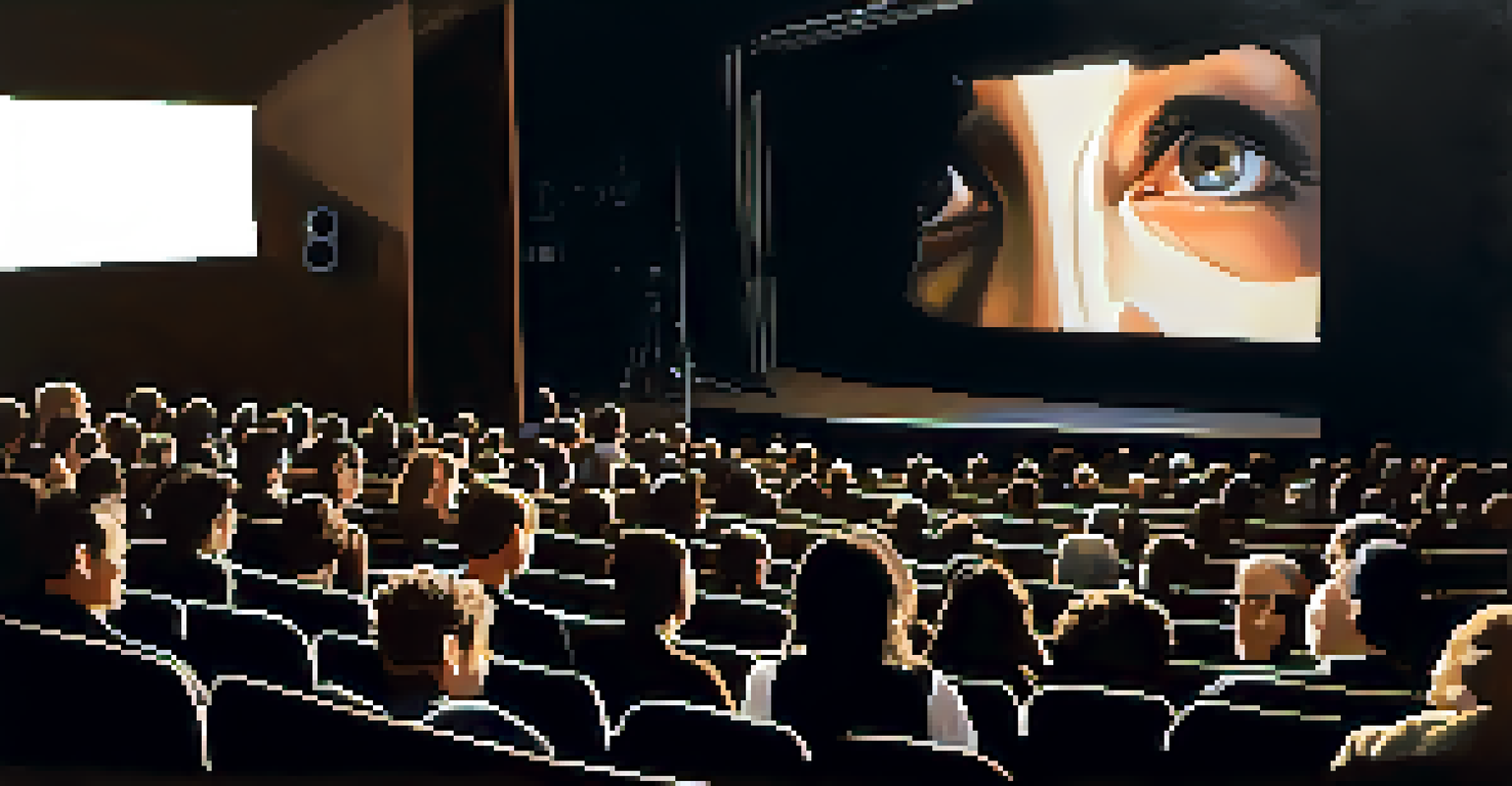The Power of Audience Reviews on Filmmaker Decisions

Understanding Audience Reviews: A Double-Edged Sword
Audience reviews play a crucial role in shaping the film industry. They provide filmmakers with immediate feedback on their work, reflecting what resonates with viewers. However, these reviews can be a double-edged sword, influencing decisions positively or negatively depending on the feedback received.
The audience is the most important part of the filmmaking process. Without them, there is no reason to create.
For instance, a film that is met with rave reviews can prompt filmmakers to pursue similar themes in future projects. Conversely, negative reviews might discourage filmmakers from exploring specific genres or techniques, leading them to adjust their creative approach. Essentially, audience feedback can guide the creative direction of a filmmaker's career.
As more people turn to platforms like Rotten Tomatoes and IMDb to voice their opinions, it becomes increasingly vital for filmmakers to pay attention to these reviews. The challenge lies in deciphering which feedback to embrace and which to disregard, as not all opinions can be universally applied.
The Role of Social Media in Shaping Reviews
Social media platforms have transformed the way audiences share their film experiences. With a simple tweet or Instagram story, viewers can express their opinions to a global audience, amplifying their voices significantly. This immediate sharing creates a buzz that can propel a film forward or hinder its success.

For instance, a film that garners positive social media buzz can experience a surge in ticket sales, encouraging filmmakers to engage with their audience more directly. Filmmakers often monitor social media channels, keen to tap into the sentiments expressed by viewers. This engagement can lead to a more profound connection between filmmakers and their audience, fostering a community around their work.
Audience Reviews Shape Filmmaking
Filmmakers can significantly influence their creative direction based on audience feedback, which can either inspire or deter future projects.
However, it also means that filmmakers must navigate the potential pitfalls of viral negativity. A single viral post can sway public opinion rapidly, making it essential for filmmakers to stay attuned to the social media landscape.
Case Studies: Films Affected by Audience Feedback
Several films have notably shifted their direction based on audience feedback. Take 'Deadpool,' for example; its initial test screenings revealed mixed reactions. The filmmakers decided to make adjustments based on audience reviews, leading to a film that not only succeeded critically but also financially.
Your best and worst reviews are usually the same. The best reviews tell you what you did well, the worst reviews tell you what you need to do better.
Another example is 'Batman v Superman: Dawn of Justice.' The negative reviews from audiences prompted Warner Bros. to rethink their approach to the DC Extended Universe. Consequently, they began to focus more on lighter tones and character development in subsequent films, illustrating how vital audience input can be.
These case studies highlight the tangible impact of audience reviews on a filmmaker's decision-making process. By learning from past experiences, filmmakers can better align their projects with audience expectations.
Balancing Artistic Vision with Audience Expectations
Filmmakers often grapple with the challenge of balancing their artistic vision with audience expectations. While feedback can provide valuable insights, filmmakers must also stay true to their creative instincts. The best films often emerge from a blend of both elements, where artistic integrity meets audience appeal.
For example, directors like Quentin Tarantino and Christopher Nolan are known for their unique storytelling styles, which can sometimes diverge from mainstream audience preferences. However, their ability to maintain a dedicated fanbase speaks to the importance of authenticity in filmmaking.
Social Media Amplifies Film Opinions
The rise of social media allows viewers to share their film experiences widely, impacting a film's success through immediate public sentiment.
Ultimately, the key lies in understanding that audience feedback is a tool rather than a strict guideline. Filmmakers who can navigate this balance effectively often create memorable films that resonate with viewers on multiple levels.
The Influence of Film Festivals on Audience Perception
Film festivals serve as a critical platform for audience reviews, often shaping perceptions long before a film is released to wider audiences. Premieres at festivals like Sundance or Cannes can generate buzz and set the tone for how a film is received. The reviews from festival-goers can significantly influence a film's marketing and distribution strategies.
For instance, a film that wins an award at a festival may see a surge in interest, often leading to broader distribution and increased box office performance. This phenomenon illustrates how early audience feedback can shape the trajectory of a film's success.
Moreover, filmmakers often use festival screenings to gauge audience reactions, allowing them to make last-minute adjustments before the official release. This direct feedback loop can be invaluable for filmmakers looking to refine their work.
The Future of Audience Reviews in Filmmaking
As technology continues to evolve, the landscape of audience reviews is likely to change as well. With the rise of artificial intelligence and data analytics, filmmakers may soon have access to more sophisticated tools to analyze audience feedback. This could lead to even more nuanced understandings of viewer preferences and trends.
Additionally, the democratization of film criticism through platforms like YouTube and TikTok allows diverse voices to be heard. This shift means that filmmakers must be prepared to consider a wider array of opinions and perspectives than ever before.
Balancing Art with Audience Expectations
Successful filmmakers often find a balance between their artistic vision and audience expectations, creating films that resonate on multiple levels.
The future of filmmaking will likely see a greater emphasis on community engagement and audience collaboration. Filmmakers who embrace this trend may find themselves creating films that resonate more deeply with viewers, ultimately leading to more successful projects.
Conclusion: Embracing the Power of Audience Reviews
In conclusion, audience reviews hold significant power in shaping the decisions of filmmakers. By actively engaging with feedback, filmmakers can gain valuable insights that enhance their craft and connect more deeply with their audience. The journey of filmmaking is not just about creating art; it's also about understanding the people who consume it.
As the film industry continues to evolve, the relationship between filmmakers and audiences will only become more intertwined. By embracing this dynamic, filmmakers can create works that not only showcase their artistic vision but also resonate with viewers on a personal level.

Ultimately, the power of audience reviews is a testament to the collaborative nature of storytelling in cinema. By valuing and learning from these voices, filmmakers can ensure that their work remains relevant and impactful.